Calreticulin Antibody (1G6A7) [FITC]
Novus Biologicals, part of Bio-Techne | Catalog # NBP1-47518F

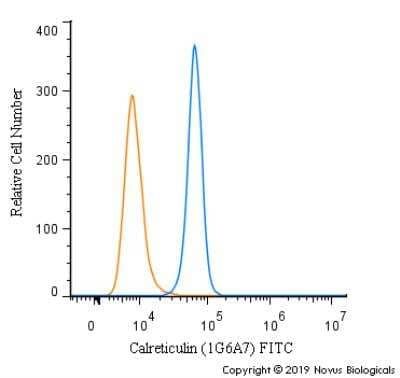
Conjugate
Catalog #
Key Product Details
Species Reactivity
Human, Mouse
Applications
ELISA, Flow (Intracellular), Flow Cytometry, Immunocytochemistry/ Immunofluorescence, Immunohistochemistry, Immunohistochemistry-Paraffin, In vitro assay, Western Blot
Label
FITC (Excitation = 495 nm, Emission = 519 nm)
Antibody Source
Monoclonal Mouse IgG2A Clone # 1G6A7
Concentration
Please see the vial label for concentration. If unlisted please contact technical services.
Product Specifications
Immunogen
Calreticulin Antibody (1G6A7) was developed against a synthetic peptide corresponding to the C-terminus (EEEDVPGQAKDELC) of human Calreticulin, conjugated to KLH. [UniProt# P27797]
Marker
Endoplasmic Reticulum Marker
Clonality
Monoclonal
Host
Mouse
Isotype
IgG2A
Scientific Data Images for Calreticulin Antibody (1G6A7) [FITC]
Flow Cytometry: Calreticulin Antibody (1G6A7) [FITC] [NBP1-47518F] - An intracellular stain was performed on NIH3T3 cells with Calreticulin (1G6A7) Antibody NBP1-47518F (blue) and a matched isotype control (orange). Cells were fixed with 4% PFA and then permeabilized with 0.1% saponin. Cells were incubated in an antibody dilution of 5 ug/mL for 30 minutes at room temperature. Both antibodies were conjugated to FITC.
Flow (Intracellular): Calreticulin Antibody (1G6A7) [FITC] [NBP1-47518F] - An intracellular stain was performed on HeLa cells with Calreticulin Antibody (1G6A7) NBP1-47518F (blue) and a matched isotype control (orange). Cells were fixed with 4% PFA and then permeabilized with 0.1% saponin. Cells were incubated in an antibody dilution of 10 ug/mL for 30 minutes at room temperature. Both antibodies were conjugated to FITC.
Flow Cytometry: Calreticulin Antibody (1G6A7) [FITC] [NBP1-47518F] - An intracellular stain was performed on U-937 cells with Calreticulin Antibody (1G6A7) NBP1-47518F (blue) and a matched isotype control (orange). Cells were fixed with 4% PFA and then permeabilized with 0.1% saponin. Cells were incubated in an antibody dilution of 5 ug/mL for 30 minutes at room temperature. Both antibodies were conjugated to FITC.
Applications for Calreticulin Antibody (1G6A7) [FITC]
Application
Recommended Usage
ELISA
Optimal dilutions of this antibody should be experimentally determined.
Flow (Intracellular)
Optimal dilutions of this antibody should be experimentally determined.
Flow Cytometry
Optimal dilutions of this antibody should be experimentally determined.
Immunocytochemistry/ Immunofluorescence
Optimal dilutions of this antibody should be experimentally determined.
Immunohistochemistry
Optimal dilutions of this antibody should be experimentally determined.
Immunohistochemistry-Paraffin
Optimal dilutions of this antibody should be experimentally determined.
In vitro assay
Optimal dilutions of this antibody should be experimentally determined.
Western Blot
Optimal dilutions of this antibody should be experimentally determined.
Application Notes
Optimal dilution of this antibody should be experimentally determined.
Formulation, Preparation, and Storage
Purification
Ammonium sulfate precipitation
Formulation
PBS
Preservative
0.05% Sodium Azide
Concentration
Please see the vial label for concentration. If unlisted please contact technical services.
Shipping
The product is shipped with polar packs. Upon receipt, store it immediately at the temperature recommended below.
Stability & Storage
Store at 4C in the dark.
Background: Calreticulin
Given its role in multiple biological processes, it makes sense that calreticulin is implicated in both healthy and disease states. Studies have found that calreticulin mutations were present in patients with myeloproliferative neoplasms (MFN) and essential thrombocythaemia (ET) (4). Calreticulin expression is typically upregulated in most cancer lines, however it is downregulated in some tissues including cervical carcinomas, prostate cancer, and human colon adenocarcinoma (3). High expression of calreticulin on cancer cells is related to tumor cell phagocytosis and is often correlated with, and counteracted by, elevated CD47 expression to prevent cancer cell phagocytosis (3). Calreticulin mutations can serve as a major diagnostic biomarker for MFN and ET and additionally the calreticulin gene may be a potential target for cancer therapeutics (3,4).
References
1. Michalak, M., Groenendyk, J., Szabo, E., Gold, L. I., & Opas, M. (2009). Calreticulin, a multi-process calcium-buffering chaperone of the endoplasmic reticulum. The Biochemical Journal. https://doi.org/10.1042/BJ20081847
2. Fucikova, J., Spisek, R., Kroemer, G., & Galluzzi, L. (2021). Calreticulin and cancer. Cell Research. https://doi.org/10.1038/s41422-020-0383-9
3. Sun, J., Mu, H., Dai, K., & Yi, L. (2017). Calreticulin: a potential anti-cancer therapeutic target. Die Pharmazie. https://doi.org/10.1691/ph.2017.7031
4. Prins, D., Gonzalez Arias, C., Klampfl, T., Grinfeld, J., & Green, A. R. (2020). Mutant Calreticulin in the Myeloproliferative Neoplasms. HemaSphere. https://doi.org/10.1097/HS9.0000000000000333
Alternate Names
Autoantigen Ro, CALR, Calregulin, cC1qR, CRT, SSA, Vasostatin
Gene Symbol
CALR
Additional Calreticulin Products
Product Documents for Calreticulin Antibody (1G6A7) [FITC]
Product Specific Notices for Calreticulin Antibody (1G6A7) [FITC]
This conjugate is made on demand. Actual recovery may vary from the stated volume of this product. The volume will be greater than or equal to the unit size stated on the datasheet.
This product is for research use only and is not approved for use in humans or in clinical diagnosis. Primary Antibodies are guaranteed for 1 year from date of receipt.
Loading...
Loading...
Loading...
Loading...
Loading...
Loading...
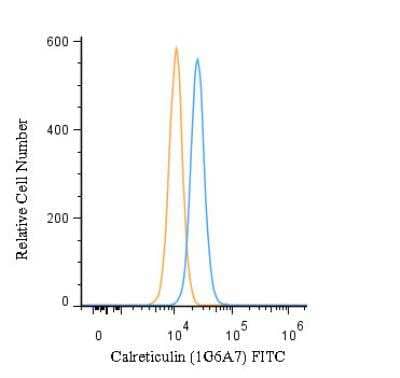
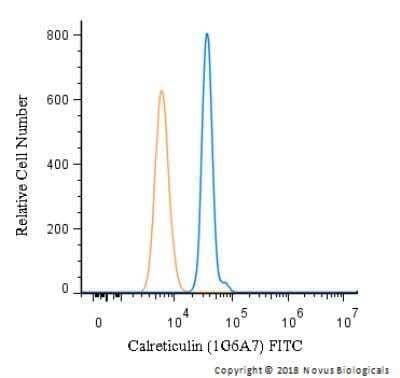
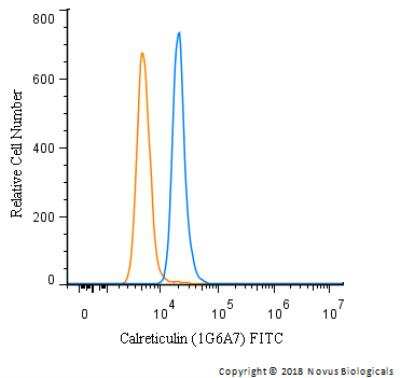
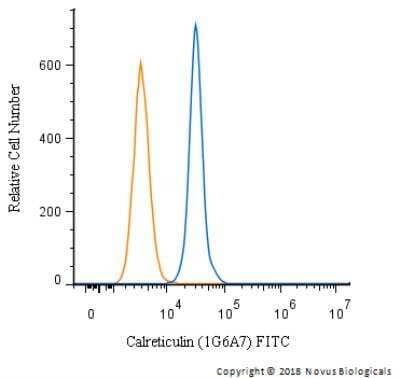
![Calreticulin (1G6A7) in U-2 OS Human Cell Line. Calreticulin Antibody (1G6A7) [FITC]](https://resources.bio-techne.com/images/products/nbp1-47518f_mouse-monoclonal-calreticulin-antibody-1g6a7-fitc-immunocytochemistry-immunofluorescence-31122024132838..jpg)